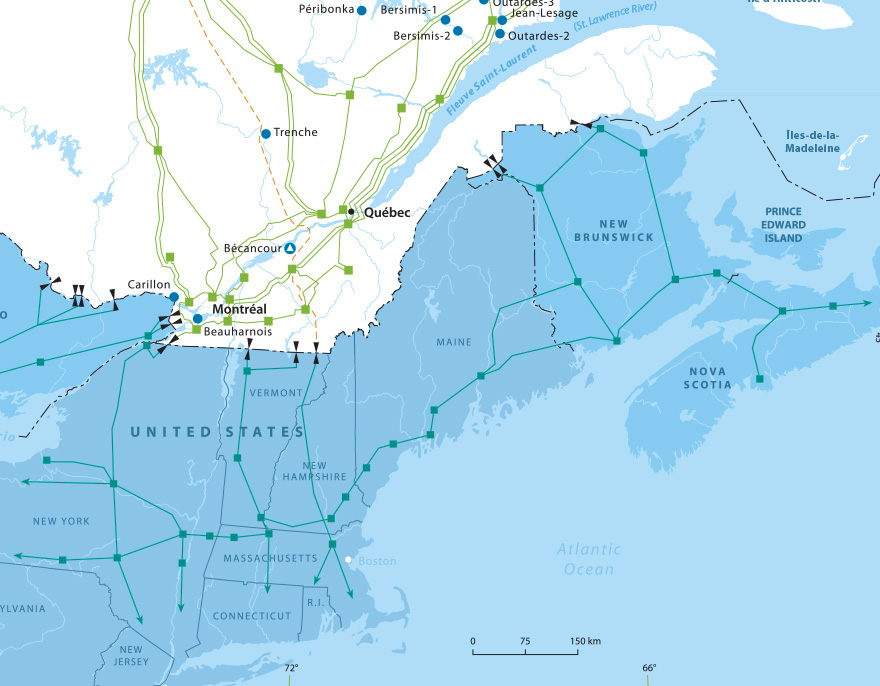Hydro-Québec operates interconnections with the power systems of Ontario, the Maritime provinces, New York State and New England. Its activities outside Québec’s borders focus on several areas.
Hydro-Québec’s business development team works closely with wholesale customers to determine their unique energy needs and to customize energy solutions.
Hydro-Québec’s U.S. subsidiary, HQUS, is authorized by the Federal Energy Regulatory Commission (FERC) to sell electricity at market-based rates in accordance with its FERC Rate Schedule No. 1
to sell electricity at market-based rates in accordance with its FERC Rate Schedule No. 1 .
.
Sales transactions concluded by HQUS are executed on the energy trading floor located at Hydro-Québec’s head office in Montréal.
Hydro-Québec is able to offer long-term supply contracts tailored to the specific needs of its customers.
Long-term contracts can have major benefits, including providing the levels of certainty necessary for large-scale infrastructure projects, such as transmission line construction. In the 1980s, two decade-long contracts paved the way for construction of Phase II of the multiterminal direct-current system (MTDCS), a cross-border line that delivers between 1,200 and 1,400 MW from northern Québec to New England on a regular basis.
Hydro-Québec currently has two long-term contracts, one with Vermont and the other with the city of Cornwall, in Ontario.
A trio of agreements signed with New Brunswick
Three agreements related to the purchase of 47 TWh of electricity by New Brunswick, the sharing of expertise and the launch of talks regarding the construction of new interconnections between the two provinces.
Hydro-Québec participates in consultations with independent system operators (ISOs), regulators, legislators and other stakeholders throughout the wholesale markets where it operates, to ensure that its exports are given equitable market access and treatment.
Hydropower from Québec has a role to play in northeastern North America’s clean energy mix.
Hydro-Québec generates 99% of its electricity from water, a source of clean, renewable energy. We develop our projects using best practices and innovative technological solutions to limit and mitigate environmental impacts. Québec hydropower can be part of the solution to North America’s major challenges of reducing GHG emissions and ensuring a secure, flexible and reliable supply of electricity.
Hydro-Québec’s business development team regularly attends events and meetings throughout Québec’s neighboring markets, talking about the advantages of hydropower.
Clean, renewable hydropower is one of the best weapons for fighting climate change in North America. Québec hydropower produces no toxic waste and emits a very small quantity of GHGs per kilowatthour generated.
Hydropower exports can therefore play a key role in economic growth that supports GHG emission reduction targets.
In 2019, our exports enabled our partners in neighboring jurisdictions to avoid the emission of nearly 7 Mt CO2 eq.—equivalent to taking 1.74 million vehicles off the road.
Many electric utilities are looking to integrate intermittent renewables, such as solar and wind power, into their energy portfolio. This trend has created a demand for energy storage solutions, a demand that Hydro-Québec is striving to meet through its work on highly promising technologies.
Combining its expertise in the chemistry of battery materials and its mastery of transmission and distribution systems, Hydro-Québec designed an innovative technology based on lithium iron phosphate (LFP) that lies at the heart of its grid-scale energy storage system.


